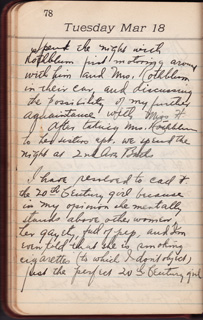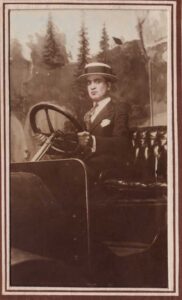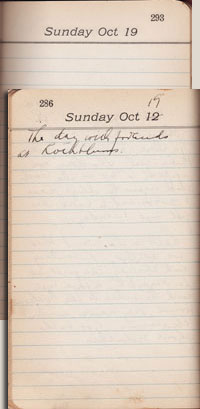
Movies & home
My only companion radio
is again entertaining me
this evening.
My heart is full of dreams,
I am longing for a girl to
love me sincerely.
I can’t bear the emptiness
of my life.
H. whom I met Saturday
is a girl that appeals to me
most. I’m planning inviting
her to the opera —
But have I the right as a
wage earner to propose to
a girl like her?
I’m happy in the thought
that she is my friend nowbeing having been introduced to me by
my friend Rothblum.
———————
Matt’s Notes
“Perhaps in the pursuit of action yesterday’s dream will be forgotten before the day is over…”
Papa wrote those words a few weeks earlier after staying out all night with friends and acquaintances from the old country. How well he knew himself, or at least enough to dread his own swings from dreaminess to disappointment.
And here it is again: Just day ago, lost in fantasies, Papa dared to think he’d met the woman who would change his world. Now he corrects himself abruptly, angrily, declares himself unworthy of her, prepares himself to settle for mere friendship. A day in the factory, an evening alone, a night with his humble possessions — radio, chair, photo of his faraway parents — have shamed him, dissolved his illusions.
To see this reminds me of why Papa’s diary feels so important to me. His beautiful, spare prose speaks richly of his struggle to reconcile what he wants with what he has and is worth reading in its own right. But taken in view of his whole life, it testifies to a deeper, more difficult struggle — the struggle for perspective familiar to those of us who swing between extremes of expectation and judgment.
Papa has as little reason to call his life “empty” as he does to think “H” can transform it, yet he is convinced each is true, and the contrast is unbearable to him. Still, we know he rode out the stormy swings of his inner life to become a man who conveyed and imparted a sense of modulation, realism, and calm. I have idealized Papa, but the more I read about him, the more I realize he must have always retained a trace of his internal changeability; perhaps it was, in part, his mastery of it that made him so remarkable. I’m certainly no stranger to the private, stormy swings he writes about. (Is anyone?) It’s good to think they might be worth it.
—————–
Additional Notes:
Movies Papa might have seen that night include:
- The Thief of Bagdad
- The Covered Wagon
- Thy Name is Woman
- The Hunchback of Notre Dame (I wonder if he saw this — it would have matched his mood)
- The Great White Way
- America
- The Ten Commandments
- A Society Scandal
- Yolanda
- The Hoosier Schoolmaster
- The Fighting Coward
The New York Times also published an article that day on the potential of the “phonofilm,” or sound movie. Author Lee De Forest takes on those who doubt its prospects and makes a strong case for the use of sound movies in news reporting and political coverage. While he’s not sure how it might help dramatic films, he seems most excited about the potential use of music. It’s worth reading here.





 The day with friends
The day with friends